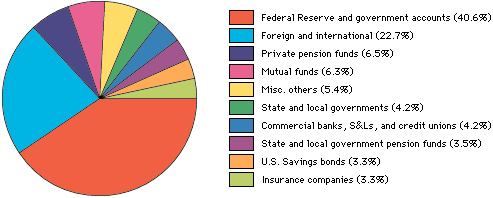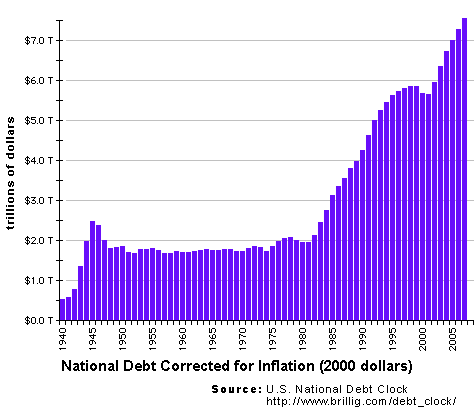Tuesday, March 30, 2010
If you think your personal credit is bad...
by Ed Hall
last modified 6 February 2008
"The budget should be balanced; the treasury should be refilled; public debt should be reduced; and the arrogance of public officials should be controlled." -Cicero. 106-43 B.C.
The purpose of this FAQ is to answer some of the questions which are asked by people visiting the U.S. National Debt Clock. If you have a question about the Debt Clock which isn't addressed here, please send me an e-mail and I'll do my best to answer it on this page.Q: To whom do we owe all this money? Who owns the Debt?Of course, your suggestions are always welcome too!
A: Here is a pie chart showing the makeup, or ownership, of the National Debt as of December 1998.Q: What is the difference between the Debt and the Deficit?

As you can see, the largest slice of the pie, over 40%, is owed to the Federal Reserve, the central bank of the United States, and to other government accounts. BTW, The Fed is actually quasi-public (part private, part government) so calling it "part of the government" is not strictly true. You can find out more about The Fed by reading Wikipedia's excellent article.
The remaining 60% of the Debt is privately held by individuals, corporations, states, and foreign governments. As of November 2007, Japan ($580 billion), China ($390 billon) and the United Kingdom ($320 bilion) are the biggest foreign holders of our Debt.
The above chart information is from the June 1999 issue of the "Treasury Bulletin", a quarterly publication of the U.S. Treasury department's Financial Management Service. The Treasury Bulletin is the best place to find the latest information on this subject.
A: The National Debt is the total amount of money owed by the government; the federal budget deficit is the yearly amount by which spending exceeds revenue. Add up all the deficits (and subtract those few budget surpluses we've had) for the past 200+ years and you'll get the current National Debt.Q: How has the National Debt grown over time?Politicians love to crow "The deficit is down! The deficit is down!" like it's a great accomplishment. Don't be fooled. Reducing the deficit just means we're adding less to the Debt this year than we did last year. Big deal -- we're still adding to the Debt. When are we going to start seeing the Debt actually go down?
A: The National Debt on January 1st 1791 was just $75 million dollars. Today, it rises by that amount every hour or so.Q: I looked at the Debt Clock yesterday and I think it showed a higher value than it does today. Is the Debt going down?The following graph shows how the National Debt has grown year by year since 1940 in actual dollar amounts, uncorrected for inflation:

This data was gathered from the U.S. Treasury department's web site.
From time to time, I've gotten e-mail saying that the above graph is flawed -- it's just showing normal inflation. Well, I took the Debt numbers from the above graph and converted them all to 2000 dollars. Picking a different year would not have changed the shape of the graph below, just its height:

As you can see, except for a rise at the end of World War II, the Debt remained remarkably constant for nearly forty years when inflationary forces are taken into account. After 1983 however, with the notable exception of the Fiscal Years ending in September of 2000 and 2001, the trend has been upward even when inflation is taken into account.
A: Unfortunately, no. On average, the Debt is always rising but there are some day to day fluctuations which can cause the debt to actually go down for a day or two. The long term averages however, show that the Debt just keeps getting higher and higher.Q: When did the Debt pass the $8 trillion mark?
A: On October 18th 2005, the Outstanding Public Debt rose to $8,003,897,406,911.24 -- the first time it had risen above $8 trillion.Q: When did the Debt pass the $7 trillion mark?
A: On January 15th 2004, the Outstanding Public Debt jumped $13 billion to $7,001,852,607,623.35. This was the first time in history the U.S. National Debt surpassed the $7 trillion mark and came less than two years after the Debt first passed $6 trillion.Q: How accurate is your Debt Clock?As a comparison, the National Debt took over six years to rise from $5 trillion to $6 trillion.
A: As accurate as I can make it! Every business day, the U.S. Treasury department releases new Debt figures for the previous day. I periodically get these figures and use them to adjust the Debt Clock's value so it remains accurate.Q: Can I put a link from my page to your Debt Clock page?I, or rather the CGI code I wrote for the Debt Clock, then calculate the current value of the Debt by a simple linear extrapolation between the recent date's value and the value for the debt about a year previously.
I also get up to date population figures from the Census Department's Population Clock and use this to calculate each person's share of the total debt.
A: Of course! Please do! Just put the following snippet of HTML code of your page and you're all set:Q: What can we do about the Debt?
I do have one request though: Please do NOT put my GIF image of the current debt figure directly onto your page. First of all, the number will always be a little out of date due to the way my CGI program is written. Secondly, visitors to your site won't be able to read the rest of my page and learn more about the Debt. Lastly, (and most importantly to me =) you are giving the impression that you, not I, did all the work necessary to create and maintain the Debt Clock.
Visit the U.S. National Debt Clock
Thanks for your understanding and your cooperation.
A: Write or call your U.S. Senators and your Representative. Tell them your concerns and ask them what they're doing to reduce both the Deficit and the Debt. If you don't like their answers, vote them out of office!Call the Concord Coalition, a group dedicated to eliminating federal budget deficits, at their toll-free number: 1-888-DEFICIT (1-888-333-4248) and ask them your questions. You may very well end up joining the Concord Coalition!
If either of your Senators or your Representative has a web page which discusses reducing the Debt (not just the deficit) and/or they have a link to my Debt Clock (I've heard that some do) drop me a line with their URL and I'll put together a list of "the Good Guys" in Congress.
Go back to the Debt Clock or go to Ed Hall's Home Page or mail me your comments.Give yourself a Gold Star for reading all the way to the end. =)
Sunday, March 21, 2010
Re: RePost

ONCE AGAIN! My shelved LP from Man Bites Dog records (get Copyrights & Empuls shit btw) for free download! Just get a taste- finna repost a bunch of shit due to wack ass zshare's limitations! Mediafire.com is basically my shit!
DOWNLOAD




